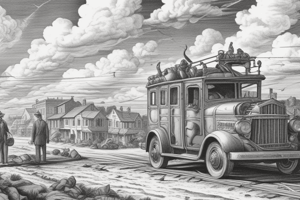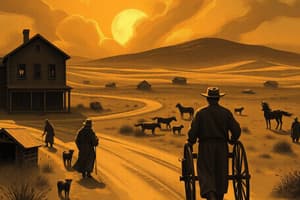Podcast
Questions and Answers
What were two main causes of the Great Depression?
What were two main causes of the Great Depression?
The stock market crash of 1929 and bank failures.
How did President Hoover respond to the onset of the Great Depression?
How did President Hoover respond to the onset of the Great Depression?
Hoover implemented limited government intervention policies and relied on voluntary cooperation.
What was the purpose of the Civilian Conservation Corps (CCC) established during the New Deal?
What was the purpose of the Civilian Conservation Corps (CCC) established during the New Deal?
The CCC aimed to provide jobs for unemployed young men and to promote environmental conservation.
Identify one major event that led the U.S. to enter World War II.
Identify one major event that led the U.S. to enter World War II.
Signup and view all the answers
What was the significance of the New Deal in shaping modern American society?
What was the significance of the New Deal in shaping modern American society?
Signup and view all the answers
Study Notes
U.S. History II Semester One Final Review
-
Great Depression: Began in 1929.
-
Speculation: High-risk investment in the stock market.
-
Black Tuesday: October 29, 1929, Stock Market crash.
-
New Deal: Roosevelt's legislation to combat the Depression.
-
Dust Bowl: Severe drought and windstorms in the 1930s.
-
Hoover's Response: Refused direct relief, believed in "rugged individualism"
-
President Hoover Characterization: Refused government aid for economic recovery; emphasized self-reliance and individual effort
-
Public Response to Hoover: Majority disapproved
-
Bonus Army: WWI veterans protested for their promised bonus payments.
-
Banking Crisis: Bank failures due to stock market crash and economic hardship.
-
FDR (Franklin D. Roosevelt): 1932 Presidential Election winner.
-
Japanese Aggression in Pacific: Driven by economic needs and territorial expansion.
-
Lend-Lease Program: U.S. financial aid to Allied powers during WWII.
-
Pearl Harbor: December 7, 1941, Attack by Japan, leading to U.S. entry in WWII.
-
World War II (WWII): Global conflict
-
Allied Leaders: Churchill (Great Britain), Stalin (Soviet Union), Roosevelt (U.S.)
-
Axis Powers: Germany, Italy, Japan
-
Holocaust: Nazi persecution of Jewish people.
-
Kristallnacht: Event marked as pogroms and violence against Jewish people
Mid-War Events (WWII)
-
Allied Invasion of France (D-Day): Allied invasion of Nazi Germany
-
Operation Fortitude: Strategy of deceiving the Allies
-
Island Hopping: US strategy in the Pacific Theater of WWII to defeat Japan
-
Atomic Bombs: Two atomic bombs were used to force the unconditional surrender of Japan.
-
Military Strategies: Strategies in both the European and Pacific theaters.
Other Significant Events
-
Nazi Party: German political party that rose in the 1930s
-
Gulag: Forced labor camps in the Soviet Union.
-
Vichy France: French collaborationist government during WWII.
-
Treaty of Versailles: Peace treaty following WWI, which had significant consequences for Germany
-
Totalitarianism: System of government in which the state controls everything.
-
Blitzkrieg: Fast-moving military strategy used by Germany.
Studying That Suits You
Use AI to generate personalized quizzes and flashcards to suit your learning preferences.
Description
Prepare for your U.S. History II Semester One Final with this comprehensive review quiz. Covering key events from the Great Depression to the lead-up of World War II, the quiz highlights crucial concepts, legislation, and figures such as FDR and Hoover. Test your knowledge on the major economic and political changes that shaped America during this era.




